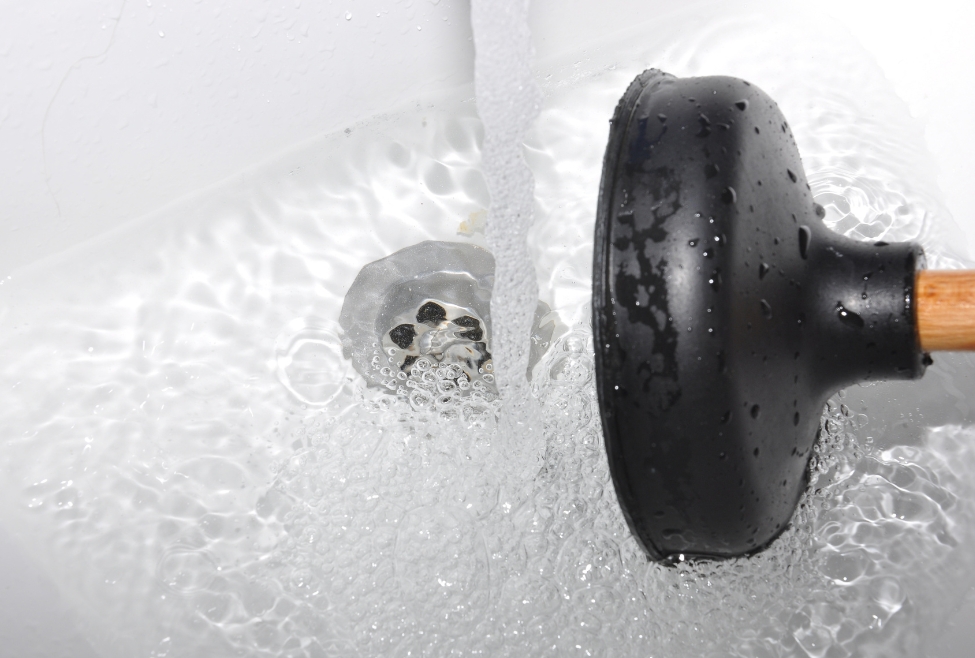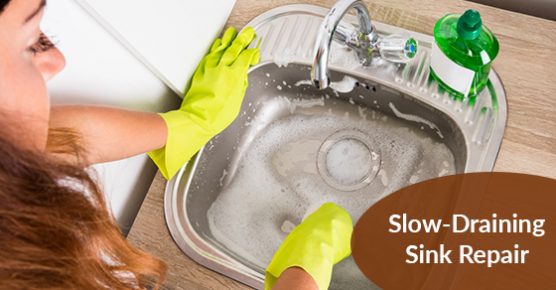The content which follows relating to 7 Ways To Fix A Slow-Draining Sink Before You Call A Plumber is absolutely intriguing. Give it a try and make your own personal assumptions.

Introduction
We've all been there: You're brushing your teeth or cleaning your hands, and you see the water merging in the sink. As opposed to swiftly swirling down the tubes, it lingers, transforming your once-refreshing morning routine into a mini overload scene. A slow-draining sink isn't simply aggravating; it's usually an indication of bigger plumbing concerns prowling beneath the surface area. Fortunately is that most slow-draining sinks can be fixed with a little knowledge, a couple of fundamental tools, and some persistence. Ready to tackle this job head-on? Let's roll up our sleeves and dive right in.
Understanding the Causes of a Slow-Draining Sink
Prior to you start poking around in your pipes, it assists to recognize what might be triggering the stagnation. Understanding the root cause makes it much easier to pick the right fix.
Common Wrongdoers Behind Slow Water Drainage
So, what's obstructing things up? Generally, it's a mixture of day-to-day debris-- assume hair, soap residue, toothpaste residue, and leftover food particles. Over time, these tiny bits accumulate and hold on to the pipeline wall surfaces, slowly narrowing the passage and making it harder for water to pass through. In some cases, natural resource from difficult water can likewise add to the crud, producing the excellent tornado for stubborn obstructions.
When is it Time to Act?
If you discover the water draining pipes slower than normal, it's a good idea to interfere sooner instead of later. Waiting as well long can lead to finish clogs, undesirable odors, or perhaps pipeline damages. If the water takes more than a couple of secs to remove after turning off the faucet, consider it a red flag and prepare to place on your DIY hat.
Tools and Products You'll Need
The right tools make all the distinction. Thankfully, you will not need a completely equipped plumbing's van to finish the job.
Crucial Tools for DIY Repair Works
A bettor is your best beginning factor. A tiny, sink-sized plunger creates suction that can remove minor clogs. For even more persistent blockages, a drainpipe serpent (occasionally called a plumber's auger) functions wonders. A set of gloves, a flashlight, and maybe a set of protective safety glasses are likewise useful.
Recommended Cleansing Solutions
Moderate recipe soap and hot water can assist break down oily build-up. A mixture of cooking soft drink and vinegar is a tried and true home remedy, and enzymatic cleansers supply a more eco-friendly technique. Keep chemical drainpipe cleaners as a last resource, as they can be rough on your pipes.
Safety And Security First: Precautions and Preparations
Before you launch into unclogging mode, consider security. You're handling possibly filthy water and debris, so slip on a pair of handwear covers. If you're utilizing chemical cleaners, guarantee the room is well-ventilated and adhere to the instructions on the tag.
Protective Gear and Work Area Arrangement
Lay down some old towels or rags around the sink location to capture sprinkles. Clear away any items that might enter your method, like soap dispensers or toothbrush owners. See to it you have great lights-- get hold of a flashlight if needed.
Step-by-Step Overview to Dealing With a Slow-Draining Sink
Now, allow's enter into the nitty-gritty. This detailed process will certainly direct you via simple methods to recover your sink's drainage.
Step 1: Get Rid Of and Tidy the Stopper
Frequently, the stopper (that small plug you lower to obstruct water) is the initial culprit. Remove it thoroughly and wipe any type of hair or gunk caught around its base. Rinse it thoroughly before placing it back in position.
Action 2: Use a Plunger to Remove Debris
Got that plunger prepared? Setting it over the drain and give it a few firm pumps. The concept is to develop suction that can loosen up any blockage. If you see bits of debris drifting up, you get on the ideal track.
Action 3: Attempt a Drainpipe Serpent or Wire Hanger
If the bettor doesn't do the trick, it's time to highlight the drainpipe snake. Gently feed it right into the drain and spin as you go. You could really feel some resistance-- that's likely the clog. Maintain turning and pulling till you get rid of the blockage. If you do not have a drain snake, a corrected cord hanger can operate in a pinch.
Tip 4: Use a DIY Drainpipe Cleanser
An all-natural cleaner made from baking soft drink and vinegar can break down recurring gunk. Pour half a cup of cooking soft drink into the drainpipe, followed by half a cup of vinegar. Allow it fizz for about 15 minutes, then flush with warm water. This chain reaction typically does marvels for small obstructions.
Tip 5: Reassemble and Evaluate the Sink
Placed whatever back together and run the faucet. Does the water now swirl away at a commendable speed? If yes, offer yourself a pat on the back. If not, don't misery-- there are still a couple of more tricks up your sleeve.
Different Approaches for Stubborn Clogs
Not all blockages are produced equal. If your sink still refuses to cooperate, consider these alternative options.
Sodium Bicarbonate and Vinegar Technique
We already discussed this, however it deserves noting once more. This gentle, environment-friendly method is more secure than chemical cleaners and typically quite efficient.
Enzymatic Drain Cleansers
Enzyme-based cleaners utilize natural germs to absorb raw material. They're an excellent option if you're wanting to avoid rough chemicals. Just keep in mind, they might take a bit longer to function their magic.
Chemical Drainpipe Cleaners: Benefits And Drawbacks
Chemical cleansers can blow up through tough clogs fast, however they're not without disadvantages. They can produce warm and fumes, damage pipes if used excessively, and pose ecological threats. Utilize them moderately, and constantly adhere to the directions carefully.
Safety Nets to Keep Your Sink Flowing
Avoidance is the best remedy. By adopting a few basic habits, you can keep your sink from slowing down to begin with.
Normal Cleaning Up Practices
Wipe down the sink container and component location regularly. Get rid of hair or food fragments prior to they have a chance to wash down the drainpipe.
Avoiding Damaging Substances Away
Reconsider prior to discarding coffee grounds, oil, or fibrous vegetable scraps down the sink. These offenders hold on to pipeline walls, developing obstructions with time.
Routine Upkeep Checks
Schedule a quick regular monthly inspection. Run hot water via the sink for a couple of minutes, taking notice of the flow. If it seems slow, act quickly prior to it becomes a full-blown obstruction.
When to Call an Expert Plumber
Occasionally, despite just how tough you attempt, that obstruct simply will not move. That's when it's time to bring in the pros.
Signs That Show an Extra Serious Issue
If your sink drains slowly despite multiple attempts, or if you see water supporting in various other fixtures (like your shower or commode), you might have a much more major plumbing concern prowling deeper in the system.
Balancing Do It Yourself Efforts with Professional Help
While DIY can conserve you cash and provide a feeling of achievement, there's no embarassment in calling a professional. A specialist plumbing professional can assess your entire plumbing setup, making certain there's no underlying damage or lasting problem that might cost you a lot more in the future.
Contrasting Prices and Long-Term Solutions
Before deciding, think about the big picture. A cheap, quick fix might fix the problem briefly, however buying an extra permanent service might conserve you cash and stress and anxiety in the long run.
Evaluating the Expenditures of Do It Yourself vs. Professional Fixes
Do it yourself solutions often cost bit greater than the cost of a plunger or a bottle of baking soft drink. Professional services, on the other hand, come with a cost however might prevent repetitive concerns and expensive repairs later on.
Purchasing High Quality Fixtures and Upgrades
If your sink's design adds to regular blockages, it may be worth upgrading to higher-quality components or altering the plumbing design. Consider this a financial investment in your home's functionality and comfort.
Final thought
A slow-draining sink can feel like a minor inflammation, yet it's typically an indication that your plumbing needs a little TLC. By understanding the root causes, employing the right devices and strategies, and devoting to basic preventive measures, you can keep your sink flowing openly. And when all else stops working, never ever wait to hire a professional-- your home's plumbing is worth the investment in care and upkeep.
Three Common Ways to Fix a Slow Drain
Baking Soda Method
Boil a full pot of water. Measure out cup of baking soda and pour it down the drain. Then take cup of the magical cleansing substance known as white vinegar and drop that down there too. Allow the mixture to fizz in the drain for five minutes as the vinegar and baking soda combine. Now dump in that whole pot of boiling water. This combination of cleaning substances should clear out anything that is causing your sink to drain slowly. If it doesn t...
Zip-It
If the baking soda method doesn t clear out your drain, it may be because a significant amount of hair and/or other debris has collected there and you need to remove it. Purchase a Zip-It tool at any home improvement or hardware store and insert it into your drain. It will catch any collected hair or debris that s blocking the flow of water. Pull it out. If it s got a big clump of hair, etc. on the end, you ve probably got your culprit.
Drain Cleaner
If these methods don t work, there is the standard drain cleaner that you can also buy in a hardware store or even your local grocery store. It s better if you can use a household solution, but these drain cleaners often work in a pinch. They re very simple to use. You generally just dump them in your drain and wait. If even this method is not effective, it may be time to call the plumber.
https://www.mrrooter.com/oneida/about-us/blog/2017/july/three-common-ways-to-fix-a-slow-drain/

As a keen reader about 4 Tips to Fix a Slow Draining Sink, I figured sharing that piece of writing was worth the trouble. Those who enjoyed our page please be sure to share it. Thanks a lot for your time invested reading it.
Book An Appointment